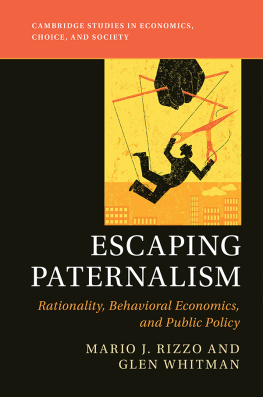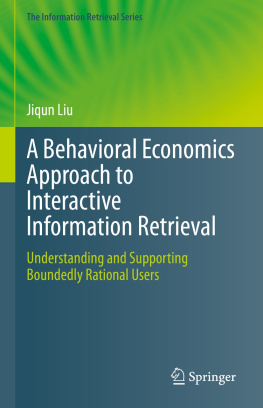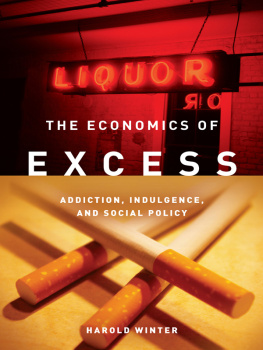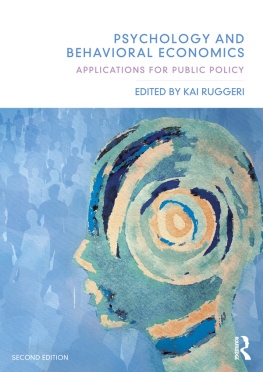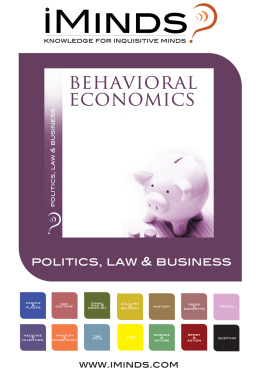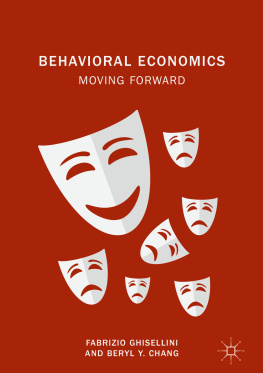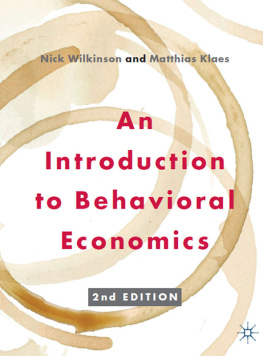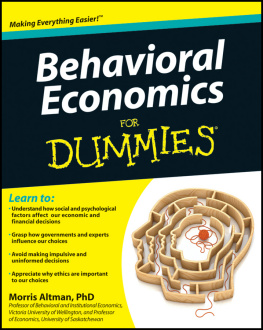The burgeoning field of behavioral economics has produced a new set of justifications for paternalism. This book challenges behavioral paternalism on multiple levels, from the abstract and conceptual to the pragmatic and applied. Behavioral paternalism relies on a needlessly restrictive definition of rational behavior. It neglects nonstandard preferences, experimentation, and self-discovery. It relies on behavioral research that is often incomplete and unreliable. It demands a level of knowledge from policymakers that they cannot reasonably obtain. It assumes a political process largely immune to the effects of ignorance, irrationality, and the influence of special interests and moralists. Overall, behavioral paternalism underestimates the capacity of people to solve their own problems, while overestimating the ability of experts and policymakers to design beneficial interventions. The authors argue instead for a more inclusive theory of rationality in policymaking.
Mario J. Rizzo is a professor of Economics, Director of the Foundations of the Market Economy Program, and Co-Director of the Classical Liberal Institute at New York University. He is the co-author of Austrian Economics Re-Examined: The Economics of Time and Ignorance . He has published in such journals as the Journal of Legal Studies , the Columbia Law Review and the UCLA Law Review .
Glen Whitman is a professor of Economics at California State University, Northridge. He is the co-editor of Economics of the Undead: Zombies, Vampires, and the Dismal Science . He has published in such journals as the UCLA Law Review , the Journal of Legal Studies , and the Journal of Economic Behavior and Organization .
Founding Editors
Timur Kuran, Duke University
Peter J. Boettke, George Mason University
This interdisciplinary series promotes original theoretical and empirical research as well as integrative syntheses involving links between individual choice, institutions, and social outcomes. Contributions are welcome from across the social sciences, particularly in the areas where economic analysis is joined with other disciplines such as comparative political economy, new institutional economics, and behavioral economics.
Books in the Series:
Benjamin Powell Out of Poverty: Sweatshops in the Global Economy
Morris B. Hoffman The Punishers Brain: The Evolution of Judge and Jury
Peter T. Leeson : Anarchy Unbound: Why Self-Governance Works Better Than You Think
Terry L. Anderson and Gary D. Libecap Environmental Markets: A Property Rights Approach
Cass R. Sunstein The Ethics of Influence: Government in the Age of Behavioral Science
Jared Rubin Rulers, Religion, and Riches: Why the West Got Rich and the Middle East Did Not
Jean-Philippe Platteau Islam Instrumentalized: Religion and Politics in Historical Perspective
Taizu Zhang The Laws and Economics of Confucianism: Kinship and Property in Preindustrial China and England
Roger Koppl Expert Failure
Michael C. Munger Tomorrow 3.0: Transaction Costs and the Sharing Economy
Carolyn M. Warner , Ramazan Kilin , Christopher W. Hale and Adam B. Cohen Generating Generosity in Catholicism and Islam: Beliefs, Institutions, and Public Goods Provision
Paul Dragos Alicia Public Entrepreneurship, Citizenship, and Self-Governance
Randall G. Holcombe Political Capitalism: How Political Influence Is Made and Maintained
Noel D. Johnson Persecution and Toleration: The Long Road to Religious Freedom
Vernon L. Smith and Bart J. Wilson Humanomics: Moral Sentiments and the Wealth of Nations for the Twenty-First Century
Andreas Thiel , William A. Blomquist and Dustin E. Garrick Governing Complexity: Analyzing and Applying Polycentricity
Mario J. Rizzo and Glen Whitman Escaping Paternalism: Rationality, Behavioral Economics, and Public Policy
Escaping Paternalism
Rationality, Behavioral Economics, and Public Policy
Mario J. Rizzo
New York University
Glen Whitman
California State University, Northridge
University Printing House, Cambridge CB2 8BS, United Kingdom
One Liberty Plaza, 20th Floor, New York, NY 10006, USA
477 Williamstown Road, Port Melbourne, VIC 3207, Australia
314321, 3rd Floor, Plot 3, Splendor Forum, Jasola District Centre, New Delhi 110025, India
79 Anson Road, #0604/06, Singapore 079906
Cambridge University Press is part of the University of Cambridge.
It furthers the Universitys mission by disseminating knowledge in the pursuit of education, learning, and research at the highest international levels of excellence.
www.cambridge.org
Information on this title: www.cambridge.org/9781107016941
DOI: 10.1017/9781139061810
Mario J. Rizzo and Glen Whitman 2020
This publication is in copyright. Subject to statutory exception and to the provisions of relevant collective licensing agreements, no reproduction of any part may take place without the written permission of Cambridge University Press.
First published 2020
Printed and bound in Great Britain by Clays Ltd, Elcograf S.p.A
A catalogue record for this publication is available from the British Library.
ISBN 978-1-107-01694-1 Hardback
ISBN 978-1-108-76000-3 Paperback
Cambridge University Press has no responsibility for the persistence or accuracy of URLs for external or third-party internet websites referred to in this publication and does not guarantee that any content on such websites is, or will remain, accurate or appropriate.
Contents
Figures
Tables
Preface
This book is the product of many years of thinking about economic rationality, its critique by behavioral researchers, and the impact of both on public policy, especially paternalistic public policy. Much has been written about whether real people are rational and the kinds of errors they may be subject to. Unfortunately, economists, and perhaps other social scientists as well, have been boxed into an excessively narrow and technical concept of rationality. This has left its imprint on the influential heuristics-and-biases literature, which claims people are not fully rational relative to that standard.
It worries us that much of the core behavioral literature is often presented as essentially settled, and many alleged biases have now attained the status of truisms. One of our tasks in this book is to show that the evidence is far weaker than has been often assumed. Similarly, the behavioral policy goal of moving people in the direction of their true preferences that is, their well-considered preferences purged of all cognitive and behavioral contaminants is often a mirage. The behavioral policy discussion frequently suffers from significant empirical difficulties and conceptual confusions.
Furthermore, the political economy of behavioral policy is fraught not only with the usual public-choice problems, but with an amplification of them due to the peculiar moralistic character of paternalist legislation. To the extent that ordinary people are afflicted by cognitive biases, we must confront the likelihood that policymakers suffer from them as well. Finally, the supposedly gentle and moderate character of behavioral policy initiatives is not a sustainable state of affairs, as we hope a reasonable analysis of their dynamic consequences will show.

